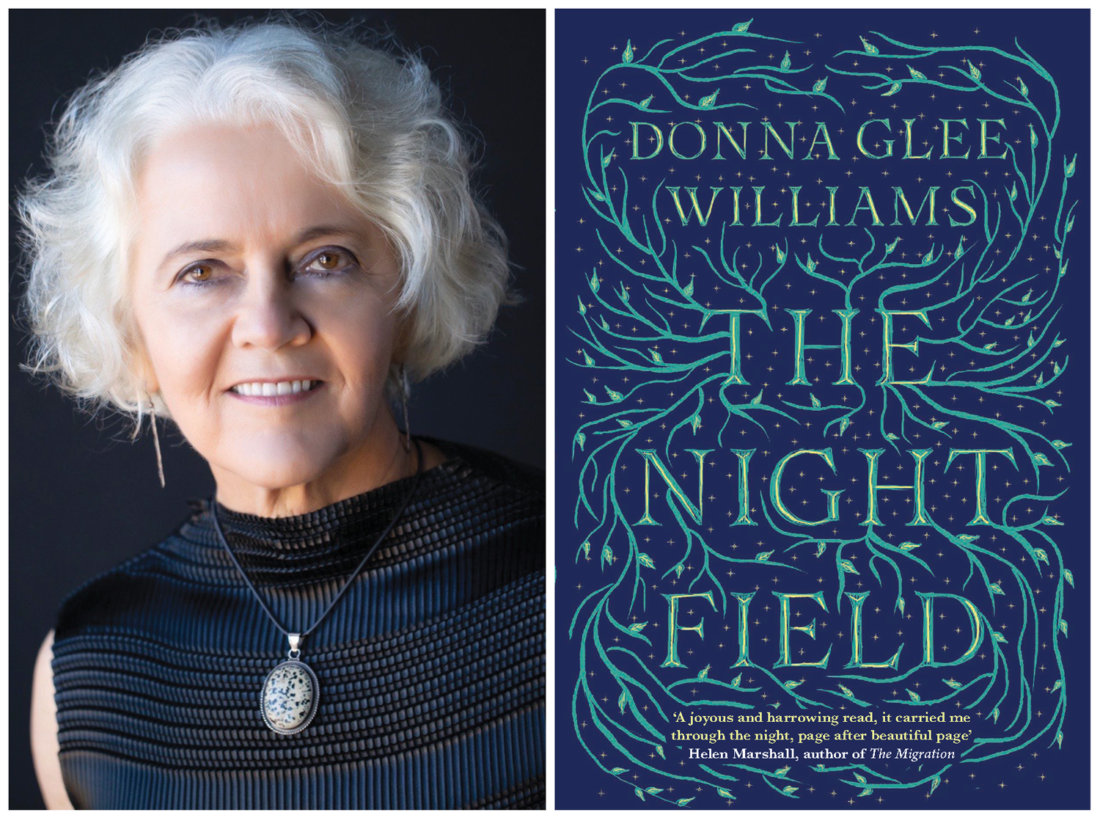by Ruby Simoneau
Novels are not written overnight — a fact local author Donna Glee Williams isn’t shy to point out. Though she’ll be celebrating the release of her latest sci-fi book, The Night Field, on Friday, July 29, at 3 p.m. at City Lights Bookstore in Sylva, the project itself dates back over a decade.
In 2008, she notes, her friend and mentor Gerald Marten shared a story about the small village of Punukula in Andhra Pradesh, India. At the time, the once-stable farming community was experiencing an ecological disaster, as the introduction of pesticides and chemical fertilizers was believed to be decimating the soil. Measurements were taken to introduce new and different types of organic crops back into the land, eventually stabilizing the situation, Williams recalls.
Later that same year, Williams received a Fulbright Senior Environmental Leadership Fellowship, allowing her to travel to India and meet village residents. Along with her environmental concerns, Williams arrived in the region as a registered nurse interested in learning more about the villagers’ public health issues. The trip, she notes, inspired the idea for what later became The Night Field.
Set in a fictional world known as the Real, Williams’ book follows Pyn-Poi, a woman drawn more to the natural world than her future role as her clan’s matriarch. But when poisonous rain, known as the Stink, starts destroying the land and its people, Pyn-Poi is called to unravel the phenomenon’s mystery. The quest takes her to unknown lands, confronted by dangers far greater than she anticipated.
Initial spark
Williams says she didn’t set out to write The Night Field as a retelling of what she witnessed in Punukula. “I wouldn’t have the guts to try and write their story,” she says of the villagers she met in 2008. “But one can take a spark and put it in a different pile of kindling and see where it goes.”
Science fiction, the author continues, felt like the best fit for what began as a short story in 2012. The genre gave her the freedom to explore abusive agricultural practices without sounding didactic. Over time, the story’s characters and themes evolved into their current form.
Part of the novel’s success stems from Pyn-Poi’s narration. Because the character lacks the scientific terminology, her story isn’t weighed down by technical jargon. “If I were to try and write this experience as nonfiction, I think it would trigger resistance,” she says. “I hope that learning this information in terms of story makes a real difference.”
Williams notes that while some of the story’s background was inspired by her time abroad, much of the Real’s topography was pulled from the Western North Carolina forests she’s called home for nearly 30 years.
“The physical sensations of being in forest — the light, your feet on slippery rocks, the sound of water — all of that comes from walking in the woods,” she says.
A community of women
The Night Field took several drafts, Williams notes, before it found its emotional center. Earlier versions, the author admits, would have left readers with little to hope for. “I thought, ‘Oh no! I have written a book that starts in a utopian Eden, moves to an adventure, has a bit of a semicomic interlude and then the whole rest of the book is death, damnation and despair.’
“You can’t do that to a reader,” she continues. “I thought a lot about Cormac McCarthy’s The Road and how he makes us stay with [his characters] on such a miserable ride. I realized it was because of love. So, I worked on [my characters’] relationships.”
In doing so, Williams created a story focused on female solidarity. Throughout her journey, Pyn-Poi is kept alive by women, and women are kept alive by the story’s protagonist.
“Classically, we’ve seen the male hero’s journey chronicled by going on an adventure, getting the treasure and bringing it back unchanged,” Williams explains. In the case of The Night Field, it is a community of women working together to serve the whole.
“The heroism of young women right now is really rising in public awareness,” the author continues. “I feel like this energy for me to create young women heroes is probably half a tribute to them and half the hope I’m serving them.”




A remarkable EP, inspired by The Night Field, is now available on Spotify. Look for Songs for The Night Field by Lynn Morgan Rosser. Enjoy!